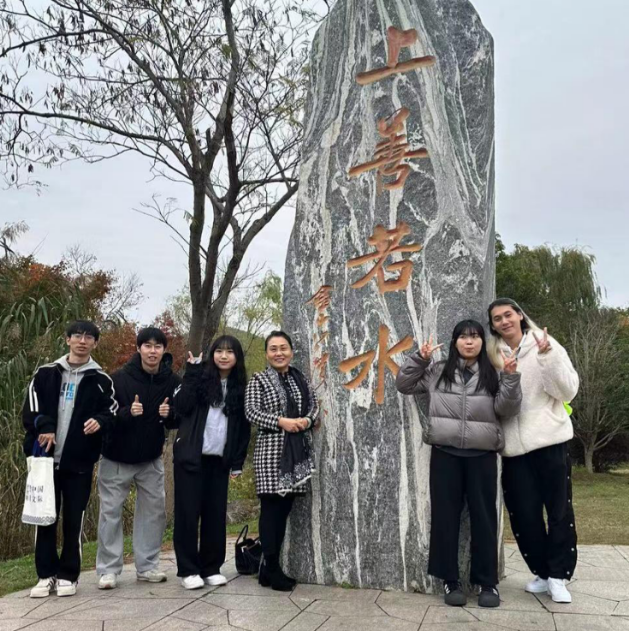On the afternoon of November 20, Prof. Ren Xiaofei, Dean of the College of Arts and Letters of Jiangsu University, led Jiangsu University International Chinese Teacher Scholarship students and international exchange students to visit Nanshan Scenic Spot in Zhenjiang, and started a unique “goodness-seeking” trip. Using the Three Character Classic and the Thousand Character Classic as the teaching materials, the program adopted the method of chanting by teachers and students, and sang the special charm of Chinese traditional culture among the green mountain.

On the bus, Prof. Ren Xiaofei led the students to review the content of the last study and gave a brief introduction to the destination of this study - Nanshan Scenic Area, which aroused the infinite desire of the students for this study course.

The first “goodness” of this journey - to be kind and charitable. At the entrance of the Nanshan Scenic Area stands a stone pagoda inscribed with the words “Be kind and charitable”. Prof. Ren explained the meaning of “goodness and charity” to the students and pointed out that “goodness” is one of the virtues that Chinese people have respected since ancient times, and students should lend a helping hand to others as far as they can, which is not only everyone's responsibility, but also a great pleasure in life. This is not only everyone's responsibility, but also a great joy in life.

Step into the gate, into the eyes of the Nanshan Scenic Area of the lakes and mountains. It was late autumn, the forest was full of color, the air was slightly humid after the rain, the mountain color was empty, and a flat boat was floating in the lake. Teachers and students were shocked by the scenery in front of them, and stopped to linger.

Teachers and students laughed along the way and discovered the second “good” of the journey - Shang Shan Ru Shui. The idiom is from Laozi: “The goodness of water is like that of water. Water is good to all things but does not strive for them, and does what is evil to all people, so it is more than the Way.” Prof. Ren took a group photo with the international students in front of the stone monument and told them about the origin and meaning of the saying “Goodness is like water”. Alex, an international student, said, “Chinese culture is really profound and profound! Just the word 'goodness' has such a rich connotation.”

In the Six Arts Hall, Luo Linpeng, a volunteer graduate student majoring in Chinese International Education, explained the six subjects of ancient Chinese educations.

The third “goodness” of this journey - “In the beginning of man, nature is inherently good”. For this course, the chanting classics “Three Character Classic” and “Thousand Character Classic” were chosen as the teaching materials, and Mr. Ren led us to chant in the pavilion, “In the beginning of man, nature is inherently good; nature is close to nature, but habits are far apart” “Heaven and earth, the universe, the universe; the sun and the moon are full, and the stars and the hosts are in the sky.” Chanting is a combination of chanting and reading, which refers to the presentation of ancient poems to a suitable tune, similar to “singing”. Students were a little shy at first, but under the encouragement of Mr. Ren, they gradually relaxed and kept practicing, gradually getting better and better, and the melodious music echoed among the green mountains and waters, and the insects and birds sang in harmony, and it seemed that man and nature had become one. Sung Lai, a Korean exchange student, sighed with emotion, “It turns out that Chinese poems can not only be read, but also sung!”
The “Chinese Classics Recitation” has carried out another unique in-depth study program of Chinese culture by learning in the way of “traveling”, which has made students have a deeper understanding of the excellent traditional Chinese culture.